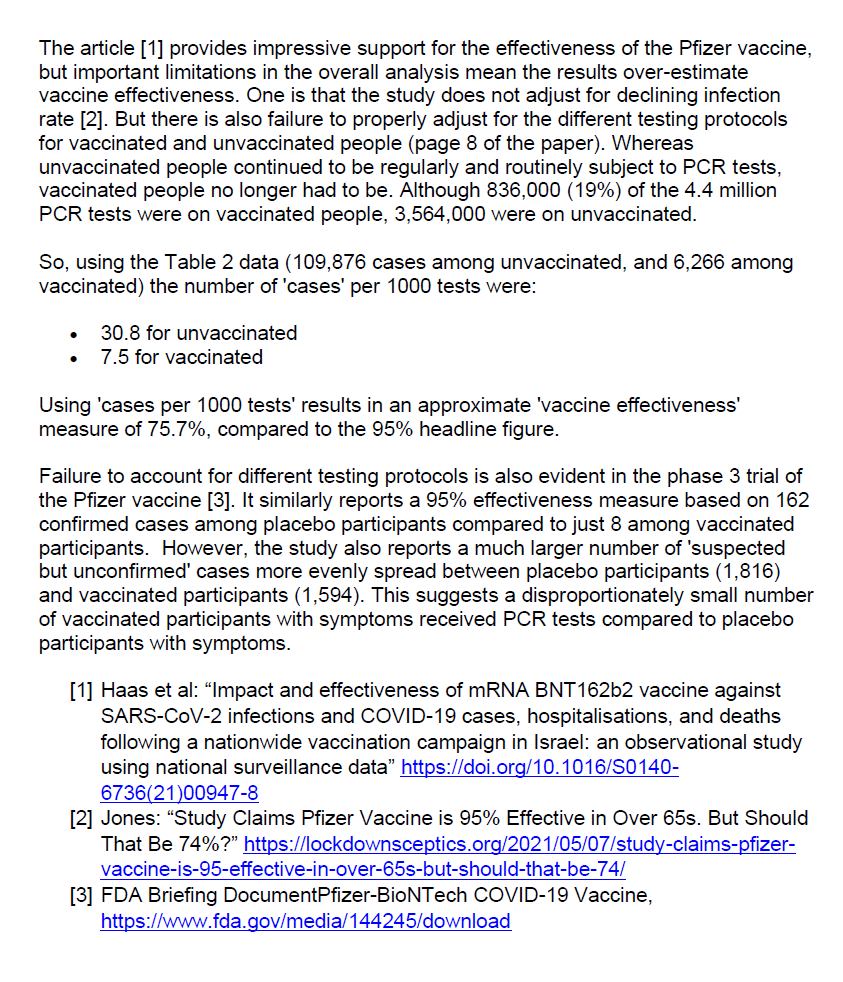
3. But the conclusions of such studies are also confounded by failing to consider non-Covid deaths; this overestimate the safety of the vaccine if there were serious adverse reactions. In fact multiple confounding factors will overestimate vaccine effectiveness.
4. One factor is how/whether a person is classified as a Covid ‘case’, Covid ‘hospitalization’ & Covid ‘death’. These can differ between vacc & unvaccinated. The unvaccinated who die ‘with’ as opposed to ‘from’ Covid are more likely to be classified as Covid deaths.
5. Another critical factor is how/whether a person is classified as ‘vaccinated’. Any person testing positive for Covid or dying of any cause within 14 days of their second dose is now classified by the CDC as ‘unvaccinated’
6. While this definition may make sense for determining effectiveness in preventing Covid infections, it may drastically overestimate vaccine safety.
7. Even if we wish to know effectiveness of vaccine just with respect to avoiding Covid infection (as opposed to avoiding death/hospitalization) there are many more factors to be considered than currently are. Here's just a simplified version of a causal model of such factors 

8. Causal models and #Bayesian inference can in principle be used to both explain observed data and simulate effect of controlling for confounding variables. However, this still requires data about relevant factors and much of these data are missing from the studies.
9. That's why we can't trust the results so far. In the absence of such data, the simplest and most conclusive evidence of vaccine evidence is to compare all-cause deaths for each age category between those who were unvaccinated and those who had at least one vaccine dose.
10. This combines both effectiveness and safety since it encapsulates trade-off between them. It’s not perfect but it completely bypasses the problem of classifying Covid ‘cases’ - which especially compromises all studies so far.
11. We could evaluate effectiveness to date of vaccines in UK by simply looking at registered deaths since start of the vaccination programme. All we need know for each registered death is person’s age and whether they received at least one dose of vaccine before death.
12. Although a longer period would, of course, be better it's still sufficiently long to show a real effect if the vaccines work as claimed and if Covid is as deadly as claimed.
13. Moving forward we should certainly be collecting this simple data, but our concern is that (in many countries) the ‘control group’ (i.e. unvaccinated) may soon not be large enough for such a simple evaluation.
15. The blog post is also here probabilityandlaw.blogspot.com/2021/09/parado…
16. Point 2 should have said "If you don’t adjust for obvious confounding factors like age in studies comparing death rates of vaccinated v unvaccinated, then the aggregated data can make it seem that death rates are higher in the vaccinated when they aren’t."
• • •
Missing some Tweet in this thread? You can try to
force a refresh






